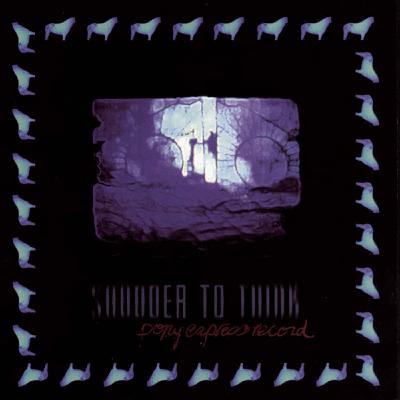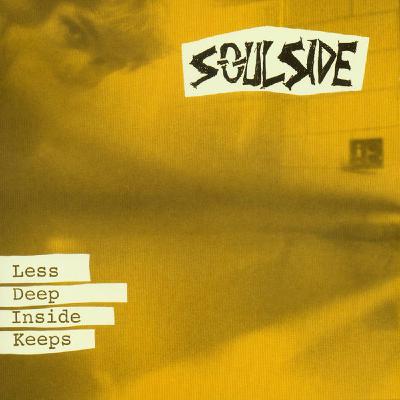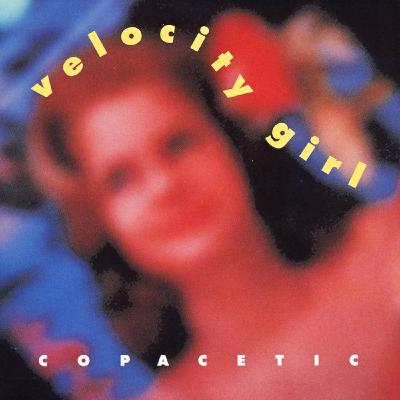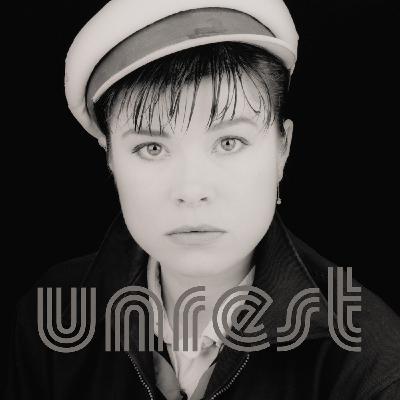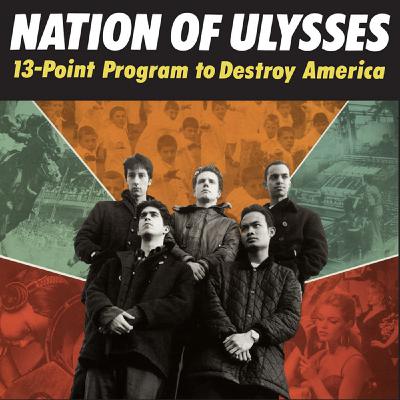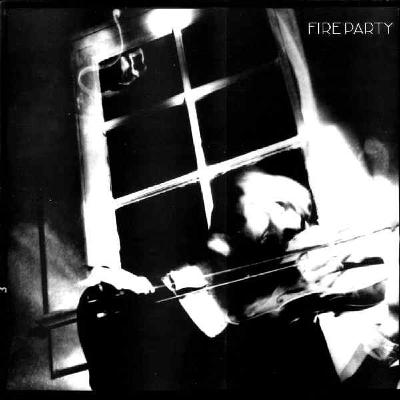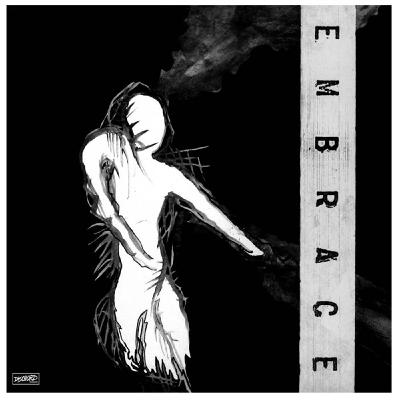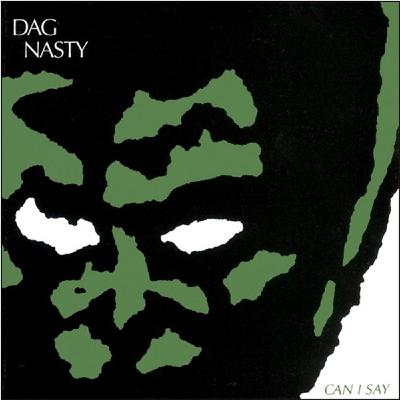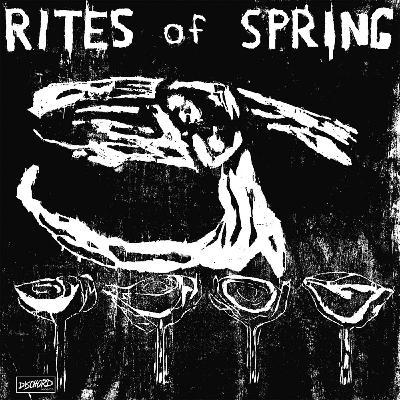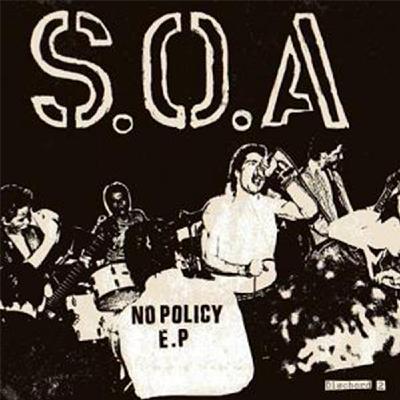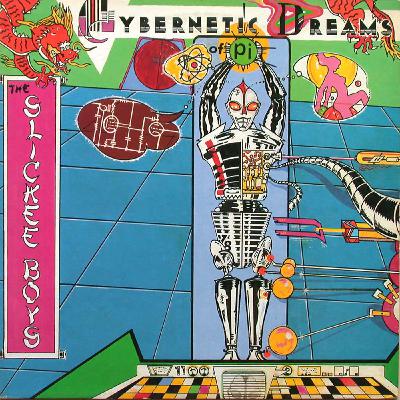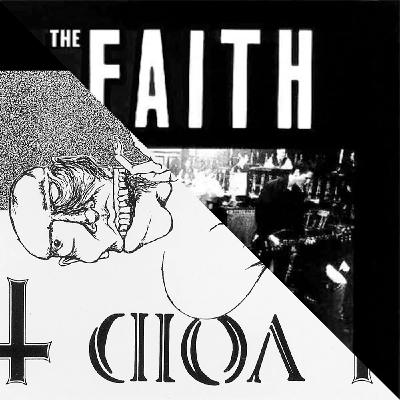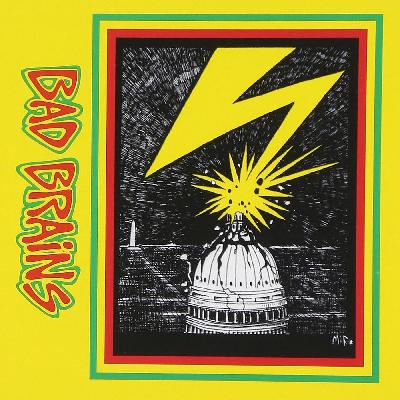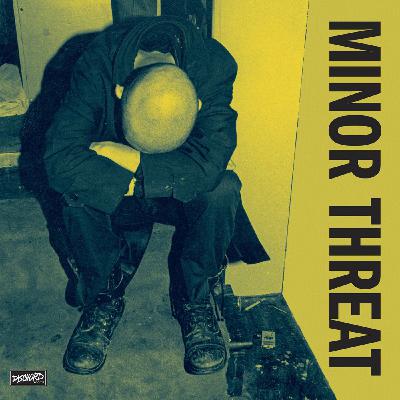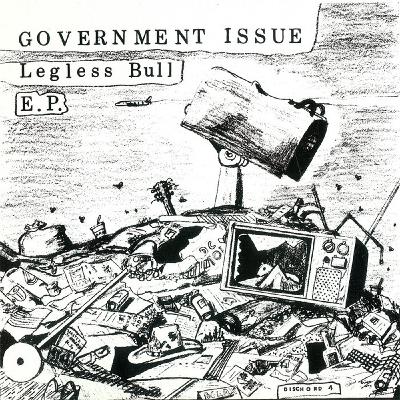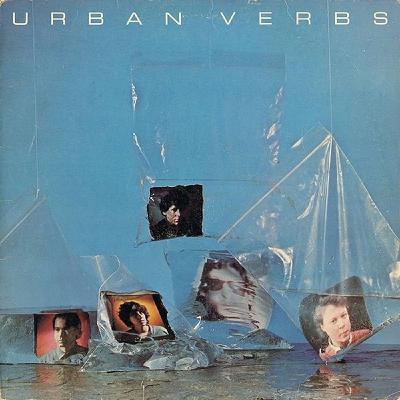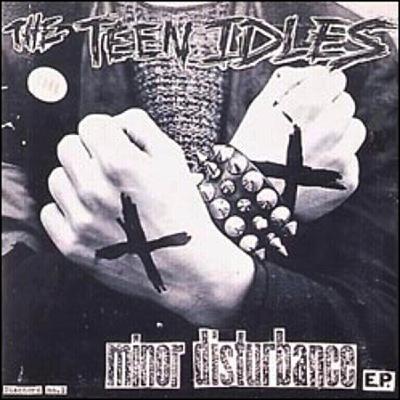Discover DC Rock History
DC Rock History

DC Rock History
Author: dcrockpod
Subscribed: 6Played: 122Subscribe
Share
© Copyright 2024 All rights reserved.
Description
Join hosts Philip Basnight and Alex Vidales as they explore Washington, D.C.’s rich rock history. Each episode uncovers iconic albums and overlooked gems, featuring stories behind the music, the artists, and the evolving local scene. Whether you’re a longtime fan or new to the city’s musical legacy, this podcast shines a light on the sounds that shaped rock in the nation’s capital. email: dcrockpod@gmail.com
33 Episodes
Reverse
In this episode, we revisit Fugazi and take a deep dive into In On The Kill Taker, the band’s explosive 1993 follow-up to Steady Diet of Nothing and Repeater. Released on Dischord Records, In On The Kill Taker captures Fugazi at a moment of creative tension and expansion, pushing their sound toward greater complexity, aggression, and emotional intensity. The album reflects a band refining its identity while challenging both punk orthodoxy and the expectations placed on them as one of the most visible groups to emerge from DC's post-hardcore scene.
By the early 1990s, Fugazi had already become a defining force in independent music, known as much for their ethics and live performances as their records. With In On The Kill Taker, Ian MacKaye, Guy Picciotto, Joe Lally, and Brendan Canty embraced sharper contrasts, darker lyrical themes, and more intricate arrangements. Songs like “Smallpox Champion,” “Rend It,” and “Cassavetes” reveal a band willing to be confrontational, vulnerable, and musically restless, mirroring the broader cultural unease of the era while remaining firmly rooted in the DC DIY tradition.
For this Season 3 finale, we’re joined by Chris Ryan, journalist, author, and host of The Watch. Together, we discuss why In On The Kill Taker stands as one of Fugazi’s most exciting and enduring records, how it fits into the band’s larger arc, and why it continues to resonate decades later. While we’ve already explored Fugazi’s origins earlier in the series, this conversation serves as a bonus chapter, focusing on a pivotal album that crystallized the band’s uncompromising vision and lasting influence.
Go Further:
Chris Ryan – The Ringer
Dischord Records – Fugazi
Pitchfork Sunday Review - In On The Kill Taker
Wikipedia – In On The Kill Taker
Follow Us:
Social media: @dcrockpod
Email: dcrockpod@gmail.com
Hosts:
Philip Basnight – Broke Royals
Alex Vidales – Pilot Waves
Podcast Artwork by Rebecca Basnight
In this episode, we explore the history and impact of Shudder to Think and their groundbreaking 1994 album Pony Express Record, a release that pushed the boundaries of what DC post-hardcore could become in the era of alternative music. Formed in 1986, Shudder to Think developed a distinctive sound across early Sammich and Dischord releases before leaning fully into the angular, theatrical, and experimental approach that defined Pony Express Record. Released on Epic Records, the album stood apart from its major-label contemporaries and became one of the most inventive records to emerge from the DC underground.
Shudder to Think came out of the same community that produced Fugazi and Jawbox, yet their music challenged the expectations of the scene from the start. The band’s lineup, featuring Craig Wedren, Chris Matthews, Stuart Hill, and Mike Russell, shifted in 1992 when Nathan Larson and Adam Wade joined, setting the stage for a new phase of songwriting and national touring. Their move from Dischord to a major label was rare for a DC band and created a unique moment where the intensity of post-hardcore intersected with the wider alternative rock boom of the 1990s.
In this conversation, we are joined by Nabil Ayers, label executive, author of My Life in the Sunshine, drummer, and host of the Identified podcast. We talk about the evolution of Shudder to Think, the creative leap represented by Pony Express Record, the challenges and opportunities of the early 90s music industry, and the album’s lasting influence. Nabil also shares valuable insights from his work in music, writing, and independent publishing, offering a wide-angle view of how this record fits within both DC history and the broader landscape of alternative rock.
Go Further:
Bandcamp – Shudder to Think
Wikipedia – Shudder to Think
Nabil Ayers – Website
Follow Us:
Social media: @dcrockpod
Email: dcrockpod@gmail.com
Hosts:
Philip Basnight – Broke Royals
Alex Vidales – Pilot Waves
Podcast Artwork by Rebecca Basnight
In this episode, we explore the history and impact of Soulside, the influential late-80s DC post-hardcore band whose music bridged the energy of the original hardcore scene with the more groove-driven, politically minded sound that would define the next decade. Formed in 1986, Soulside crafted a bold and evolving style heard on records like Trigger and Hot Bodi-Gram, and became one of the most internationally recognized bands of the DC underground through extensive U.S. and European touring.
Emerging from the same community that produced Rites of Spring, Scream, and Fire Party, Soulside brought together Bobby Sullivan, Scott McCloud, Johnny Temple, and Alexis Fleisig at an explosive moment in the scene’s evolution. Following Soulside’s breakup, McCloud, Temple, and Fleisig teamed up with Eli Janney and Brendan Canty to form Girls Against Boys, a project that evolved into one of the defining post-hardcore bands of the 1990s.
In this conversation, we’re joined by Johnny Temple, bassist of both Soulside and Girls Against Boys, and the publisher behind Brooklyn-based Akashic Books. We talk about the late-80s DC punk landscape, Soulside’s musical progression, the band’s European tours, and the transition into GVSB’s dual-bass, groove-heavy sound. Johnny also shares insights into the creative and cultural shifts happening in the scene at the time, and how the same DIY principles that shaped DC punk informed his later work in independent publishing.
Go Further:
Bandcamp - Soulside
Wikipedia – Soulside
Akashic Books – Website
Follow Us:
Social media: @dcrockpod
Email: dcrockpod@gmail.com
Hosts:
Philip Basnight – Broke Royals
Alex Vidales – Pilot Waves
Podcast Artwork by Rebecca Basnight
In this episode, we explore Copacetic, the 1993 full-length debut from Velocity Girl, a band that helped expand the definition of what Washington, DC-area indie rock could sound like in the early ’90s. Released on Sub Pop at a time when the national spotlight was widening around alternative music, Copacetic blended restless guitar textures, melodic clarity, and a confident sense of atmosphere into one of the era’s most enduring records.
Formed at the turn of the decade, Velocity Girl grew out of the College Park and Silver Spring music communities, releasing early singles on Slumberland Records and steadily gaining visibility through college radio, touring, and compilation appearances. By the time they entered the studio for Copacetic, the band’s lineup — Sarah Shannon, Archie Moore, Brian Nelson, Kelly Riles, and Jim Spellman — had developed a clear artistic identity rooted in texture, harmony, and a uniquely East Coast take on shoegaze-influenced guitar music.
In this conversation, we’re joined by Jeffery Everett, the award-winning designer behind Rockets Are Red. We talk about the visual culture surrounding early-’90s indie rock, the importance of design and identity in an era shaped by DIY aesthetics, and how bands like Velocity Girl balanced local roots with growing national attention. Jeffery offers insights into the intersection of music and graphic design, how posters and album art shaped the perception of scenes like D.C.’s, and why Copacetic remains a defining example of the moment when independent music and broader industry forces briefly overlapped.
Go Further:
Sub Pop – Copacetic
Wikipedia – Velocity Girl (Copacetic)
AllMusic – Velocity Girl Biography
Rockets Are Red - Website
Follow Us:
Social media: @dcrockpod
Email: dcrockpod@gmail.com
Hosts:
Philip Basnight – Broke Royals
Alex Vidales – Pilot Waves
Podcast Artwork by Rebecca Basnight
In this episode, we explore Perfect Teeth, the 1993 swan song from Unrest, a band that redefined what DC and Northern Virginia indie rock could be. Released on the legendary UK label 4AD, the album blended minimalist pop, rhythmic precision, and clean-toned experimentation into a concise, stylish statement that still resonates three decades later.
Formed in 1983 by Mark Robinson, Philip Krauth, and Tim Moran, Unrest began as a suburban basement band in Arlington, Virginia. Over the next ten years, they evolved into one of the most distinctive voices in American indie music. Alongside their own recordings, Robinson founded Teen-Beat Records, a label that combined DIY punk values with graphic design, eccentric curation, and a numbered catalog system that became iconic in its own right.
In this conversation, we’re joined by Mark Robinson, Unrest’s guitarist, co-vocalist, and Teen-Beat founder. We talk about the band’s formation in the early ’80s, the lo-fi cassette years, the arrival of bassist Bridget Cross, the band’s art-pop sensibility, and the bold recording decisions that led to Perfect Teeth including a 7-inch box set and a faux Simon Le Bon production credit. We also discuss how Unrest carved a lane completely their own within the broader DC scene.
Go Further:
4AD Records – Perfect Teeth
Teen-Beat Records
Wikipedia – Unrest (band)
Pitchfork – Perfect Teeth 30th Anniversary Review
Teen-Beat Archive – Perfect Teeth
Follow Us:
Social Media: @dcrockpod
Email: dcrockpod@gmail.com
Hosts:
Philip Basnight – Broke Royals
Alex Vidales – Pilot Waves
Podcast Artwork by Rebecca Basnight
In this episode, we explore 13-Point Program to Destroy America, the 1991 debut album from Nation of Ulysses that turned DC’s post-hardcore scene on its head. Released by Dischord Records and recorded at Inner Ear Studios with Ian MacKaye and Don Zientara, the album fused punk, free jazz, and radical politics into a chaotic and satirical critique of American conformity.
Formed in 1988 by Ian Svenonius, James Canty, Steve Kroner, Steve Gamboa, and Tim Green, Nation of Ulysses presented themselves not just as a band, but as a “political party” advocating for youth liberation and creative revolution. With their sharp suits, manifesto-style lyrics, and explosive performances, they pushed the boundaries of what DC punk could sound and look like.
In this conversation, we’re joined by John R. Davis, musician, curator, and author of Keep Your Ear to the Ground: A History of Punk Fanzines in Washington, D.C. (Georgetown University Press). We discuss how Nation of Ulysses reflected and redefined the DC underground at the dawn of the 1990s bridging music, politics, and performance in a way that continues to influence artists today.
Go Further:
Dischord Records – 13-Point Program to Destroy America
Georgetown University Press – "Keep Your Ear To The Ground"
Wikipedia – Nation of Ulysees
Dance of Days by Mark Andersen and Mark Jenkins – Akashic Books
Follow Us:
Social Media: @dcrockpod
Email: dcrockpod@gmail.com
Hosts:
Philip Basnight – Broke Royals
Alex Vidales – Pilot Waves
Podcast Artwork by Rebecca Basnight
In this episode, we explore 13 Songs, the seminal compilation that introduced Fugazi’s raw urgency and experimental edge to a wider audience. Originally released in 1989 by Dischord Records, 13 Songs combines the band’s first two EPs Fugazi (1988) and Margin Walker (1989) and stands as a defining document of the post–Revolution Summer era in Washington, D.C.
Formed by Ian MacKaye, Joe Lally, Brendan Canty, and later joined by Guy Picciotto, Fugazi built on the intensity of their hardcore roots while incorporating dub, minimalism, and socio-political critique into their sound. Recorded at Inner Ear Studios in Virginia and Southern Studios in London, the two EPs captured a band coming into their power, forging a sound that was at once confrontational and disciplined, spacious and relentless.
In this conversation, we’re joined by Jim Saah, the D.C.-based photographer and filmmaker whose iconic live shots helped define DC hardcore's visual legacy. We talk about the band’s early shows, the scene that gave rise to their sound, and how 13 Songs became a blueprint for the future of independent music.
Go Further:
Dischord Records – 13 Songs
Wikipedia – 13 Songs
Fugazi Live Series
Dance of Days by Mark Andersen and Mark Jenkins – Akashic Books
Follow Us:
Social Media: @dcrockpod
Email: dcrockpod@gmail.com
Hosts:
Philip Basnight – Broke Royals
Alex Vidales – Pilot Waves
Podcast Artwork by Rebecca Basnight
In this episode, we explore Fire Party, the self-titled debut from one of the most groundbreaking bands to emerge from Washington, D.C.’s post–Revolution Summer punk scene. Formed in 1986 by Amy Pickering (vocals), Natalie Avery (guitar), Kate Samworth (bass), and Nicky Thomas (drums), Fire Party brought a new perspective to D.C. punk — politically charged, emotionally direct, and unapologetically their own.
Recorded at Inner Ear Studios with Don Zientara engineering and Ian MacKaye producing, the album captures the raw energy of late ’80s Dischord Records while pushing its sound into more melodic and introspective territory. The band’s 1988 European tour with Scream marked one of the first international tours for a Dischord act and solidified Fire Party’s reputation as both trailblazers and torchbearers of a more inclusive punk movement.
In this conversation, all four founding members reflect on the scene that shaped them, their first shows at D.C. Space, and how their music helped open the door for future generations of feminist and alternative punk artists.
Go Further:
Dischord Records – Fire Party
Wikipedia – Fire Party (band)
Dance of Days by Mark Andersen and Mark Jenkins – Akashic Books
Follow Us:
Social Media: @dcrockpod
Email: dcrockpod@gmail.com
Hosts:
Philip Basnight – Broke Royals
Alex Vidales – Pilot Waves
Podcast Artwork by Rebecca Basnight
In this episode, we dive into Embrace, the posthumously released self-titled album from one of the most pivotal bands of Washington, D.C.’s Revolution Summer movement. Though only active from 1985 to 1986, Embrace brought together vocalist Ian MacKaye (Minor Threat) with three former members of the Faith, guitarist Michael Hampton, bassist Chris Bald, and drummer Ivor Hanson, to create a record that helped redefine punk’s emotional and musical boundaries.
Our guest is Mark Jenkins, longtime D.C. writer and co-author of Dance of Days. Together, we explore how Embrace captured a moment of transition in the D.C. hardcore scene, why the album was released a year after the band broke up, and how it reflects the shift toward personal introspection, community-minded values, and experimentation during the mid-1980s.
We also look at Embrace’s role within the broader context of Revolution Summer, the media’s early attempts to label this new sound as “emocore,” and how the album connects the dots between Minor Threat’s raw energy and Fugazi’s expansive post-hardcore vision.
Go Further:
Dischord Records – Embrace
Wikipedia – Embrace (American band)
Dance of Days by Mark Andersen and Mark Jenkins – Akashic Books
Follow Us:
Social Media: @dcrockpod
Email: dcrockpod@gmail.com
Hosts:
Philip Basnight – Broke Royals
Alex Vidales – Pilot Waves
Podcast Artwork by Rebecca Basnight
In this episode, we dive into Can I Say, the 1986 debut album from Dag Nasty - a record that helped define melodic hardcore and mark a turning point in Washington, D.C.’s punk history. Formed in 1985 by guitarist Brian Baker after the breakup of Minor Threat, Dag Nasty united veterans of the D.C. scene including Colin Sears, Roger Marbury, and vocalist Dave Smalley. Together, they bridged the aggression of hardcore with melody and introspection, creating a sound that would influence punk and emo for decades to come.
Our guests are Broke Royals, aka Philip's own band! Together, we explore how Can I Say balanced speed and precision with emotional depth, how it was recorded at Inner Ear Studios with Ian MacKaye producing and Don Zientara engineering, and why this album continues to resonate nearly forty years later.
We also look at Dag Nasty’s role within the second wave of Dischord Records bands, their connection to the evolving D.C. scene of the mid-1980s, and how Can I Say laid the groundwork for future generations of melodic punk and post-hardcore.
Go Further:
Dischord Records – Can I Say
AllMusic – Dag Nasty
"Dance of Days" by Mark Andersen and Mark Jenkins - Akashic Books
Follow Us:
Social Media: @dcrockpod
Email: dcrockpod@gmail.com
Follow Us:
Philip Basnight – Broke Royals
Alex Vidales – Pilot Waves
Podcast Artwork by Rebecca Basnight
In this episode, we explore Rites of Spring, the 1985 self-titled release that intertwined with Revolution Summer and reshaped the direction of punk in Washington, D.C. and beyond. Rites of Spring formed in 1984 with Guy Picciotto (vocals, guitar), Eddie Janney (guitar), Mike Fellows (bass), and Brendan Canty (drums). The band built on the foundation of hardcore but infused their songs with personal and emotional intensity, creating a record that is often cited as a cornerstone of post-hardcore and what would later be labeled “emo.”
Our guest is Mark Andersen, co-founder of Positive Force DC and co-author of Dance of Days: Two Decades of Punk in the Nation’s Capital. Mark shares his first-hand experiences of seeing Rites of Spring live, the atmosphere of the D.C. punk community in 1985, and the ways in which the band’s performances helped spark a new sense of purpose in the scene. Together, we discuss how Rites of Spring’s music reflected a moment of transition, carrying forward the urgency of hardcore while opening space for vulnerability and connection.
We also examine the album’s recording at Inner Ear Studios with Don Zientara and Ian MacKaye, the relationship of the band to contemporaries like Embrace and Beefeater, and the enduring influence of Rites of Spring as a defining work in D.C.’s underground history.
Go Further:
Dischord Records – Rites of Spring
AllMusic – Rites of Spring
Follow Us:
Social Media: @dcrockpod
Email: dcrockpod@gmail.com
Philip Basnight – Broke Royals
Alex Vidales – Pilot Waves
Mark Andersen – Dance of Days, Positive Force DC
Podcast Artwork by Rebecca Basnight
In this episode, we explore No Policy, the 1981 EP by SOA, and Damaged, the legendary debut LP from Black Flag. Formed in Washington, D.C. by Henry Garfield (later Henry Rollins), Michael Hampton, Wendel Blow, and Simon Jacobsen, SOA delivered ten tracks in just over eight minutes, capturing the urgency and fury of the early D.C. hardcore scene. Released as Dischord Records’ second-ever release, No Policy marks Rollins’ first recorded appearance—raw, unrelenting, and full of promise.
We then follow Rollins’ transformation from a Georgetown ice cream shop worker to frontman of Black Flag. After jumping on stage at a New York City show in 1981, he was recruited to join the West Coast hardcore pioneers. The result, Damaged, is a cornerstone of American punk and a brutal, poetic chronicle of alienation, rage, and inner turmoil.
Our guest is Jackson Sinnenberg, who helps us unpack the rapid evolution of Rollins’ voice, stage presence, and creative philosophy. Together, we explore the shared DNA of No Policy and Damaged, and how one D.C. kid’s journey helped fuse two punk scenes into a national hardcore movement.
Go Further:
Dischord Records – SOA – No Policy
Wikipedia – Black Flag (band)
Henry Rollins – Wikipedia
"Dance of Days" - Akoshic Books
Follow Us:
Social Media: @dcrockpod
Email: dcrockpod@gmail.com
Philip Basnight – Broke Royals
Alex Vidales – Pilot Waves
Jackson Sinnenberg – WAMU || Capitol Bop
Podcast Artwork by Rebecca Basnight
In this episode, we explore Too Many Humans and Teen Love, the 1983 release from No Trend that challenged both punk and mainstream sensibilities in DC’s underground scene. No Trend was from from Ashton, Maryland consisting of Jeff Mentges (vocals), Frank Price (guitar), Bob Strasser (bass), and Michael Salkind (drums). They took a confrontational approach to music, combining minimal, abrasive instrumentation with lyrics that satirized social norms and punk culture alike.
Our guest is Chris Richards, pop music critic for The Washington Post and founding member of Q and Not U. Chris shares his perspective on No Trend’s impact and the broader context of the DC scene in the early 1980s. Together, we discuss how No Trend’s approach to music and performance reflected a unique moment in DC’s hardcore history, bridging experimental sounds and an anti-conformist ethos.
We also examine the band’s recording process at Inner Ear Studios, their relationship to the wider DC scene, and the legacy of Too Many Humans and Teen Love as defining works in the city’s underground music history.
Sponsor:
Get 10% off New Columbia Record Club with checkout code DCROCKS
Go Further:
AllMusic – No Trend
Touch and Go Records – No Trend
Follow Us:
Social Media: @dcrockpod
Email: dcrockpod@gmail.com
Philip Basnight - Broke Royals
Alex Vidales - Pilot Waves
Chris Richards - Washington Post
Podcast Artwork by Rebecca Basnight
In this episode, we explore Cybernetic Dreams of Pi, the 1983 release from The Slickee Boys that blends garage rock revivalism with punk attitude and sci-fi themes. The Slickee Boys had been a fixture in the DC music scene since the mid-1970s, building a dedicated following with their irreverent stage shows and DIY approach to recording. With a lineup featuring Mark Noone on vocals, Kim Kane and Marshall Keith on guitars, Dan Palenski on drums, and John Chumbris on bass, the band delivered an album that balanced catchy hooks with an adventurous spirit.
Our guest is Don Zientara, founder of Inner Ear Studios and one of DC’s most influential recording engineers. Don shares insights on working with The Slickee Boys and the recording of Cybernetic Dreams of Pi, as well as the role of Inner Ear Studios in shaping the sound of DC’s music scene. Together, we discuss how The Slickee Boys’ album fits within the broader story of DC rock, from their early DIY singles to their lasting influence on the city’s underground music community.
We also examine the album’s production process, the impact of Inner Ear Studios on the DC scene, and how The Slickee Boys helped expand the boundaries of what punk rock could be in the nation’s capital.
Sponsor:
Get 10% off New Columbia Record Club with checkout code DCROCKS
Go Further:
Don Zientara – Inner Ear Studios
Dance of Days by Mark Andersen and Mark Jenkins
Trouser Press – The Slickee Boys
Follow Us:
Social Media: @dcrockpod
Email: dcrockpod@gmail.com
Philip Basnight - Broke Royals
Alex Vidales - Pilot Waves
Don Zientara - Inner Ear Studios
Podcast Artwork by Rebecca Basnight
In this episode, we explore the Faith/Void Split, the legendary 1982 release from Dischord Records that captures the duality of the early D.C. hardcore scene. Released as Dischord Records #8, the album pairs Faith’s tight, melodic hardcore with Void’s chaotic, genre-defying intensity. Both bands, formed by teenagers, contributed to the diverse evolution of hardcore punk in the nation’s capital.
Our guest is Thurston Moore, guitarist of Sonic Youth and author of Sonic Life, whose exploration of punk’s formative years and D.C.’s unique underground scene offers insights into the album’s enduring impact. Together, we discuss how the Faith/Void Split influenced not only the local punk landscape but also laid the groundwork for the post-hardcore and noise rock movements that followed.
We also examine the album’s production at Inner Ear Studios, the role of Dischord Records, and the cultural significance of the split LP format in fostering a sense of community and creative experimentation in the early 1980s.
Sponsor:
Get 10% off New Columbia Record Club with checkout code DCROCKS
Go Further:
Sonic Life by Thurston Moore
Dance of Days by Mark Andersen & Mark Jenkins
Dischord Records – Faith/Void Split
Follow Us:
Social Media: @dcrockpod
Email: dcrockpod@gmail.com
Philip Basnight - Broke Royals
Alex Vidales - Pilot Waves
Thurston Moore - Sonic Life
Podcast Artwork by Rebecca Basnight
In this episode, we dive into Bad Brains’ self-titled 1982 classic, which still stands as one of the most explosive albums in punk history. Recorded at 171-A Studios in New York, the album blends elements of hardcore punk and reggae, and is widely regarded as a foundational release in the development of American hardcore. Known for its speed, technical proficiency, and incorporation of Rastafarian themes and the philosophy of Positive Mental Attitude (PMA), the album helped establish Bad Brains as a central figure in the early 1980s punk scene.
Our guest is Bartees Strange, a musician whose work spans punk, indie rock, and experimental pop. In this episode, we discuss the origins of Bad Brains, their early performances in Washington, D.C., and how their fusion of genres and high-energy shows contributed to their influence on punk scenes nationwide.
We also explore the circumstances surrounding the “Banned in D.C.” narrative, the production and distribution of their debut cassette, and the lasting legacy of the band across punk, hardcore, reggae, and alternative music communities.
Sponsor:
Get 10% off New Columbia Record Club with checkout code DCROCKS
Go Further:
PMA: Positive Mental Attitude by Napoleon Hill
Dance of Days by Mark Andersen & Mark Jenkins
Bartees Strange – Official Site
Follow Us:
Social Media: @dcrockpod
Email: dcrockpod@gmail.com
Philip Basnight – Broke Royals
Alex Vidales – Pilot Waves
Bartees Strange – Official Site
Podcast Artwork by Rebecca Basnight
In this episode, we dig into Minor Threat and In My Eyes, the two EPs that make up First Two 7”s. Across twelve blistering tracks, Minor Threat laid down the foundation for DC hardcore with a sound that was fast, focused, and unapologetically direct.
Our guests are Eduardo Nunes of Discologist and Scott Crawford, the filmmaker behind Salad Days and Creem: America’s Only Rock ’n’ Roll Magazine. Together, we explore the band’s early impact, the emergence of Straight Edge, and the lasting power of a group that never stuck around long but still changed everything.
This episode centers around records produced by Skip Groff and engineered by Don Zientara at Inner Ear Studios. From the birth of Straight Edge to the tension behind “Out of Step,” we explore how these two short records created a lifelong blueprint for punk communities around the world.
Sponsor:
Get 10% off New Columbia Record Club with checkout code DCROCKS
Go Further:
Minor Threat – First Two 7”s on Dischord
Salad Days (dir. Scott Crawford)
Our Band Could Be Your Life by Michael Azerrad
Dance of Days by Mark Andersen & Mark Jenkins
Follow Us:
Social Media: @dcrockpod
Email: dcrockpod@gmail.com
Philip Basnight – Broke Royals
Alex Vidales – StageCraft
Eduardo Nunes – Discologist | Wammies
Scott Crawford – IMDb
In this episode, we dive into the early days of Government Issue and their blistering 1981 debut EP Legless Bull. As the fourth release on Dischord Records, this 10-song, 9-minute blast helped define the label’s emerging sound and captured the chaotic energy of a scene in formation.
We’re joined by Paul Vodra of Hometown Sounds to unpack how Government Issue fit into the fast-shifting DC hardcore landscape. From their unpracticed live debut to their confrontational lyrics, we explore how John Stabb and company became unlikely architects of a movement. Paul also shares the story behind Hometown Sounds, his enduring love for mashups, and the challenges of keeping your ears fresh as a longtime DC music tastemaker.
This episode centers around a record produced by Ian MacKaye and engineered by Don Zientara, recorded in the earliest days of Inner Ear Studios. Tune in as we explore the impact of Legless Bull, the rise of Straight Edge, and the enduring legacy of a band that never fit the mold.
Go Further:
Government Issue – Legless Bull on Dischord
Dance of Days by Mark Andersen & Mark Jenkins
Hometown Sounds
Follow Us:
Social Media: @dcrockpod
Email: dcrockpod@gmail.com
Philip Basnight – Broke Royals
Alex Vidales – StageCraft
Paul Vodra – Hometown Sounds | DJ Paul Vodra on Instagram
Sponsor:
Get 10% off New Columbia Record Club with checkout code DCROCKS
In this episode, we dive into the story of the Urban Verbs and their 1980 self-titled debut. One of the earliest bands to bridge punk and art rock in Washington, D.C., Urban Verbs helped set the stage for the city’s evolving underground scene. With sharp guitars, moody synths, and a theatrical presence, they brought a new wave sensibility to a city still finding its sound.
We’re joined by Andrew Grossman of The North Country to explore how Urban Verbs shaped early D.C. rock history both as a band and as key players behind the founding of the Atlantis, the precursor to the legendary 9:30 Club. Together, we unpack the band’s connections to Talking Heads, their role in the Atlantis boycott divide, and why their Warner debut captured a moment when D.C. rock could have gone in many different directions.
This episode centers around the 1980 album that caught Brian Eno’s attention, seeded the rise of Inner Ear Studios, and marked a turning point between the city’s punk roots and its more experimental future. Tune in as we trace the ambition, artistry, and legacy of the Urban Verbs.
Go Further:
Wikipedia – Urban Verbs
Washington City Paper – “Backstage with Urban Verbs”
Dance of Days by Mark Andersen and Mark Jenkins
Follow Us:
Social Media: @dcrockpod
Email: dcrockpod@gmail.com
Philip Basnight – Broke Royals
Alex Vidales – StageCraft
Andrew Grossman – The North Country
Sponsor:
Get 10% off New Columbia Record Club with checkout code DCROCKS
In this episode, we dive into the beginnings of D.C. hardcore with the Minor Disturbance EP by Teen Idles. This is the very first release on Dischord Records and a flashpoint for a new musical movement. Clocking in at just over ten minutes, this ferocious debut from four D.C. high schoolers helped launch an entire scene, complete with fast riffs, hand-drawn Xs, and a new ethos of DIY independence.
We’re joined by music writer and podcast host Rob Harvilla (60 Songs That Explain the 90s and the 2000s) to explore how Minor Disturbance laid the groundwork for what would become one of the most influential punk communities in the world. Together, we unpack the band’s Bad Brains-fueled inspiration, their role in the rise of straight edge, and how this short, sharp record managed to say so much with so little.
This episode centers around the 1980 EP that started it all... from the Wilson High School hallways to Inner Ear Studios and eventually into punk history. Tune in as we trace the energy, ideology, and legacy of the Teen Idles.
Go Further:
Dischord Records – Teen Idles
Dischord Records – Minor Disturbance EP
60 Songs That Explain the 90s & the 2000s
Dance of Days by Mark Andersen and Mark Jenkins
Follow Us:
Social Media: @dcrockpod
Email: dcrockpod@gmail.com
Philip Basnight – Broke Royals
Alex Vidales – StageCraft
Rob Harvilla – The Ringer
Artwork by Rebecca Basnight
Sponsor:
Get 10% off New Columbia Record Club with checkout code DCROCKS



